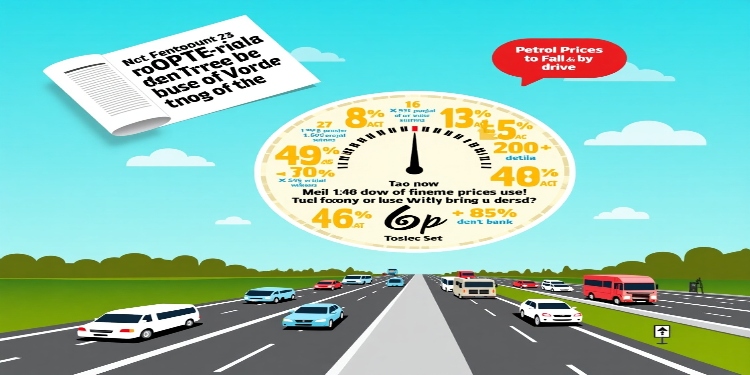The cost of oil has been tumbling in recent days following the ongoing tariff confusion prompted by President Trump and the prospect of trade wars impacting the value of the commodity. While these trade policies have prompted widespread economic concerns, motorists may be set to benefit from cheaper petrol costs in the days ahead. But are drivers hindering their own fuel economy without realising it?
With the threat of tariffs prompting fear throughout different industries, the price of Brent Crude oil fell to its lowest levels since April 2021 in recent days, dipping as low as $63.49 a barrel.
According to Simon Williams, head of policy at the RAC, drivers are likely to see the cost of petrol fall by up to 6p per litre as a result of the uncertainty. This could significantly lower the price of filling up at the pumps after prices have steadily increased in recent years.
However, British motorists may be their own worst enemies when it comes to making the most of fuel efficiency, with many car owners doing little to make the cost of filling up stretch beyond the petrol pumps.
Fuel efficiency can be impacted by many different factors related to your driving and your car itself. With this in mind, let’s look at some of the biggest pitfalls that could see you continuing to pay more to fill up even as oil prices fall:
1. Turn That Air Con Off
If you want to make your fuel economy stretch further, one of the best measures to take is to turn your air conditioning off when it’s not needed.
We’ve become accustomed to the convenience of air conditioning, helping to make our journeys that little bit more comfortable on cold or warm days, so much so that we often leave it on when it’s not needed.
However, air conditioning takes power from your engine in order to keep your car at the right temperature, meaning that you’ll need to refill with petrol more frequently if you constantly leave your air con on during every journey.
Instead, try to lower your windows to keep your car cool. For the best fuel economy, adopt a window mindset when travelling at lower speeds and switch to air conditioning when moving faster in order to reduce costly drag.
2. Lighten Your Car Up
Many of us UK motorists are guilty of letting our cars become cluttered by items in the boot and left on passenger seats. While it can be tempting to avoid carrying frequently used items to and from the car, be sure to take out anything that could be weighing your vehicle down when not needed.
According to Ford, it’s estimated that carrying an additional 45kg of items in your car can increase fuel consumption by 2%, and this figure can really add up when you use your vehicle for commutes or on long journeys. With this in mind, regularly audit the items in your car and their relevance.
3. Top Up Your Tyre Pressure
Underinflated tyres can harm your steering and create more rapid wear and tear. This can not only lead to a greater chance of tyre blowouts, but it can also significantly lower your fuel economy.
Be sure to check your tyre pressure regularly and top it up if levels begin to lag below the specified requirements that can be found inside your driver door, under your fuel cap, or in the vehicle handbook.
4. Check Your Wheel Alignment
Improper wheel alignment can lead to uneven tyre wear and issues with handling, both of which can impact your efficiency.
According to Kwik Fit, annual alignment checks may ultimately help to add up to 12,000 miles to the life of your tyre, which can significantly improve not only the longevity of your tyres but also your fuel efficiency due to less drag caused by worn tyres.
5. Get Damaged Windscreens Replaced
Drag weighs heavily when it comes to fuel efficiency, and one key contributor can be windscreens with troublesome chips and cracks.
Even if your chipped windscreens aren’t obstructing your view of the road, they can harm your car’s aerodynamics to the point that your fuel economy is adversely affected over time. By adopting a proactive approach and by getting your windscreen replaced by professionals when chips and cracks emerge, you have the best chance of making your petrol miles stretch further over time.
6. Smooth Driving Saves Pounds
Another important consideration to make is to use your power of anticipation to its full capacity to maintain a smooth driving experience.
Keeping your car moving at the right speed can be great for fuel efficiency. Although road conditions can affect your ability to keep things smooth, anticipating braking in advance and avoiding constantly hitting the brake pedal and accelerator can be perfect for avoiding the overuse of fuel.
Keep things gentle with the steering wheel, accelerator, and brakes, and remember to stay in gear while slowing down to maximise your efficiency. Additionally, anticipating hills by accelerating a little in advance before easing off as you drive up can help to stretch your petrol’s value that little bit further.
Getting Value for Money at the Pumps
Although the price of petrol is expected to come down over the weeks ahead, many of Britain’s motorists can do more to get value for money beyond the pumps.
By taking care of necessities like tyre pressure, managing the weight of items left in your boot, and watching out for any sources of drag, you can give yourself the best chance of making your money stretch even further every time you fill up.
Motoring can be an expensive part of life, but that doesn’t mean you can’t make your finances cover more ground when it comes to fuel efficiency.

